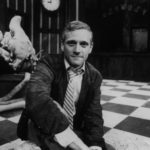 Two-time Oscar-winning writer Howard Ashman was born May 17, 1950, in Baltimore. At age 6, he discovered his passion at Children’s Theater Association. His first known writing was L’il Abner’s Poke Chops, which he also directed and starred in at age 10. He spent a year at Boston Univ., then transferred to Goddard College, where he earned a B.A. in theater (1971). For his master’s at Indiana Univ., he wrote the libretto for a children’s musical based on Hans Christian Andersen’s “The Snow Queen.”
Two-time Oscar-winning writer Howard Ashman was born May 17, 1950, in Baltimore. At age 6, he discovered his passion at Children’s Theater Association. His first known writing was L’il Abner’s Poke Chops, which he also directed and starred in at age 10. He spent a year at Boston Univ., then transferred to Goddard College, where he earned a B.A. in theater (1971). For his master’s at Indiana Univ., he wrote the libretto for a children’s musical based on Hans Christian Andersen’s “The Snow Queen.”
In 1974, he moved to New York, working as book editor by day and playwright by night. He had two one-acts produced “only one night, sans sets, costumes, everything, but … I’m in heaven,” he told his sister. In 1976, Circle Rep workshopped his play The Confirmation, and WPA Theater produced his musical Dreamstuff, which he wrote with Marsha Malamet and Dennis Green. The following year, Ashman and boyfriend Stuart White became WPA’s co-artistic directors. A year later, the WPA musical Gorey Stories transferred to Broadway.
In 1979, Ashman wrote a new libretto for The Vagabond King at Houston Grand Opera and directed a workshop of Maury Yeston’s Nine at the O’Neill Theatre Center. He then acquired rights to create a musical based on God Bless You, Mr. Rosewater, and Yeston suggested that Ashman work with composer Alan Menken. It opened in May 1979 at the WPA and transferred in October for a monthlong Off-Broadway run. The following year, White left WPA (and Ashman). Below are excerpts from the 2016 Encores! revival of Mr. Rosewater.
Ashman and Menken next wrote the revue Real Life Funnies (1981), adapted from Stan Mack’s Village Voice comic strip, and the musical Babe, based on the life of Babe Ruth. MTC produced the first show, but Ashman abandoned the second in favor of a musical based on the low-budget film Little Shop of Horrors. That show opened in May 1982 at the WPA and transferred in July for a five-year Off-Broadway run. It brought Ashman, his first Drama Desk Award as well as Grammy and Olivier nominations. For the 1986 film version, Ashman wrote the screenplay and lyrics for two new songs, including “Mean Green Mother from Outer Space,” which earned an Oscar nomination.
Over the next few years, Ashman wrote with several other composers, including Jonathan Sheffer on songs for the revue Diamonds (1984); with Marvin Hamlisch on the Broadway musical Smile (1986), which earned Ashman his first Tony nomination; and with Barry Mann on the song “Once upon a Time in New York City” for Disney’s film Oliver & Company (1986), which earned Ashman his second Grammy nomination. Below are the 60 Minutes story on the making of Smile and the official Huey Lewis video of the Oliver & Company song.
While at Disney, Ashman learned of another project the studio had been working on for a few years: The Little Mermaid. Ashman asked Menken to join him for the film, which began what is considered to be the Disney Renaissance. The score received nominations for three Oscars, two Golden Globes, and two Grammys, earning one of each for the song “Under the Sea.”
Ashman and Menken next contributed to the anti-drug special Cartoon All-Stars to the Rescue (1990), for which they won a special Emmy Award for the song “Wonderful Ways to Say No,” and to the 1990 benefit An Evening with Friends of the Environment, including “I’m No Angel” and “Fire Down Below.” Below are Ashman’s Emmy-winning song and a clip of Cher singing the two benefit songs.
While working on Little Mermaid, Ashman pitched an animated musical adaptation of Aladdin. He wrote a 40-page treatment, but the studio shelved the idea and recruited him and Menken to instead write songs for Beauty and the Beast (1991). During production, Ashman’s health began to decline. Soon after the first screening of the film, Ashman died on March 10, 1991, in Manhattan. The film would go on the earn nominations for three Oscars, three Golden Globes, and four Grammys, with the title song winning all three awards.
Beauty and the Beast screenwriter Linda Woolverton reworked Ashman’s Aladdin treatment, then directors Ron Clements and John Musker wrote a draft. As several more rounds of rewrites occurred, Tim Rice joined Menken to fill out the final score, which included three Ashman lyrics: “Arabian Nights,” “Prince Ali,” and the Oscar- and Golden Globe-nominated “Friend Like Me.” The soundtrack earned Ashman his fifth Grammy Award.
https://youtu.be/Yhqfd3DbzJw
Since his death, Ashman’s work has seen a resurgence, including the Broadway premieres of Beauty and the Beast (1994, Tony nomination), Little Shop of Horrors (2003), The Little Mermaid (2008, Tony nomination), and Aladdin (2014, Tony nomination) as well as the London premiere of Beauty and the Beast (1997, Olivier Award) and Off-Broadway revival of Little Shop of Horrors (2019, Lortel nomination). Among the many tributes to Ashman have been the WPA revue Hundreds of Hats (1995), the album Howard Signs Ashman (2008), and the documentary Howard (2018).
